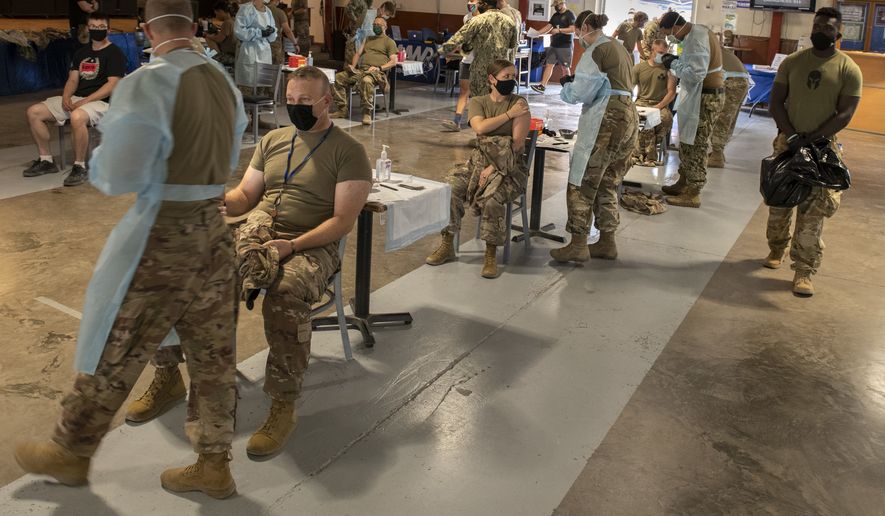The Pentagon’s looming COVID-19 vaccine mandate for all troops threatens to push the military into the middle of yet another divisive culture battle, this time over personal health choices versus the collective responsibility to prevent deadly outbreaks in the ranks.
At the direction of President Biden, Defense Secretary Lloyd Austin is moving “expeditiously” to determine how quickly the military could carry out vaccination and testing requirements. The dramatic step will surely prove unpopular in some corners of the armed forces, but legal scholars say it is virtually certain to hold up in court. The necessity also underscores the difficulty the Pentagon has encountered in its vaccination drive.
Substantial numbers of soldiers, sailors, airmen and Marines aren’t fully vaccinated despite an aggressive push by Mr. Austin and top commanders across each military service. Defense Department officials are recalibrating their response to the surge of the deadlier, more contagious delta variation of the coronavirus, just as their civilian counterparts have to do.
Pentagon figures show just over 1 million troops are fully vaccinated. That includes active-duty forces, reserves and National Guard troops.
As of June 30, about 68% of active-duty troops had received at least one shot, officials said.
Those figures have been trending upward but still reflect significant vaccine skepticism. Bitter partisan battles have engulfed the nation’s response to the pandemic, some analysts and military insiders say, and the divisive issue of mandated vaccinations is viewed through different lenses depending on political leanings or stages of life.
“In saner days, compulsory military vaccinations against a global pandemic which has killed over 4 million people wouldn’t have been too controversial,” said J.D. Gordon, a former Pentagon spokesman who is now an analyst with One America News Network. “Yet since America’s top medical experts destroyed their own credibility by injecting themselves into politics — e.g., describing President Trump’s political rallies as ’superspreader events’ while Antifa-[Black Lives Matter] riots somehow weren’t — it’s easy to understand skepticism in the ranks.”
Furthermore, the Defense Department isn’t pushing for vaccine mandates in a vacuum. Critics say an anti-extremism initiative is too broadly defined and could inadvertently sweep up conservatives and Catholics in the ranks. The Pentagon vehemently denies this charge.
Pentagon leaders also have had to fend off charges in conservative media and on Capitol Hill that the military has embraced “critical race theory,” which has become the primary battlefield in the culture wars between left and right. Mr. Austin has said isolated incidents of critical race thinking at some military institutions do not equal an endorsement of the overall theory. Critical race theory essentially puts racism at the center of American history dating back centuries.
The push for vaccinations clearly differs in many ways from those cultural fights, but the significant resistance indicates a strong undercurrent of opposition to any mandates by federal, state or local governments.
To combat that sentiment, military leaders are casting mandatory vaccines as a way to ensure America’s fighting force is fully healthy and ready to defend the nation. The pandemic last year cast a heavy cloud over military readiness, capped by an incident on the USS Theodore Roosevelt, which was forced to cut short a Pacific mission because of a massive outbreak of COVID-19 among the crew.
Moving quickly
Mr. Austin has told reporters he is prepared to enact the president’s directive swiftly.
“I’ll go back and consult with my medical professionals … and we’ll outline the steps for the way ahead,” he said at a press conference in Manila. “We’ll move this expeditiously, if possible. You know, quite frankly, I’m inclined to move towards making sure that everybody is properly protected.
“We’ll look at this with our medical professionals and the service secretaries, the chiefs, and they will outline that timeline. But we won’t let grass grow under our feet,” he said. “The president directed us to do something, and we’ll get after it.”
By instituting strict safety measures in the early days of the pandemic, the Pentagon has kept the COVID-19 death count in the ranks remarkably low. The Navy reported that two sailors died late last month, bringing the total military toll to 28, according to the most recent Defense Department figures. That number does not include civilian Defense Department employees or contractors.
The military has reported a total of about 313,000 cases, and just over 4,300 of those required hospitalization. As a whole, more than 613,000 Americans have died from COVID-19.
Even as the delta variant drives up numbers in parts of the country, the increases in cases, deaths and hospitalizations in the military have not been dramatic.
Some legal scholars and military analysts say mandated vaccines could change the minds of vaccine-wary civilians.
“I believe vaccinations ought to be required for the military. Among other things, it would set the right example for the rest of the country,” said retired Air Force Gen. Charles J. Dunlap Jr., now the executive director of the Center on Law, Ethics and National Security at Duke University.
Gen. Dunlap said the military could allow for religious exemptions as a matter of policy, though such a step wouldn’t be legally necessary.
“Given the threat of COVID, I don’t think the Constitution requires religious waivers,” he said.
Unlike the Trump era, when the commander in chief and Pentagon leaders made public disagreements clear, Mr. Biden and top military officials seem to be on the same page about COVID-19 and mandated vaccinations. Specialists say that agreement will go a long way.
“Since the Biden administration logically hired ideologically aligned people who follow instructions to run the government, it will be a lot easier for them to accomplish their goals compared to the previous administration,” Mr. Gordon said. “They will largely do whatever they want.”
• Ben Wolfgang can be reached at bwolfgang@washingtontimes.com.




Please read our comment policy before commenting.